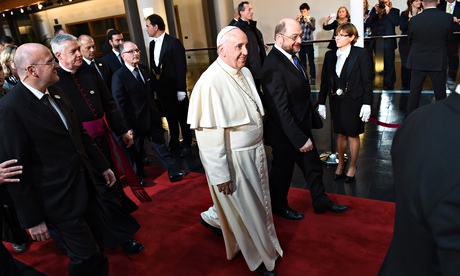The Guardian view on the pope’s speech to the European parliament: rediscover your core values
Europe is far from over. It’s a continent of many blessings
Editorial
The Guardian, Thursday 27 November 2014
Jump to comments (67)
 Pope Francis leaves the European parliament in Strasbourg. 'Far from seeking to fuel further disenchantment with the EU, this was a strong-minded plea for a better Europe.' Photograph: Reuters
Pope Francis leaves the European parliament in Strasbourg. 'Far from seeking to fuel further disenchantment with the EU, this was a strong-minded plea for a better Europe.' Photograph: ReutersFew speeches about Europe these days arouse much enthusiasm. The subject is more likely to be greeted with boredom or acrimony, the debate conducted in instant and shallow slogans. So the pope’s message to the European parliament in Strasbourg on Tuesday, calling for a break from the current angst and “a return to the conviction of the founders of the European Union” came as something of a shock.
It did not play down the woes and inadequacies of the current state of European affairs. On the contrary, the speech included descriptions of the “distrust of citizens towards institutions considered to be aloof, engaging in laying down rules perceived as insensitive to individual people”. But those – step forward, Nigel Farage – who thrive on channelling populist sentiment against the very essence of the European project would be fools or, more likely, cynics to claim that Pope Francis has vindicated them in any way.
Indeed, far from seeking to fuel further disenchantment with the EU, this was a strong-minded plea for a better Europe, one in tune with its founding values of “human dignity” and fundamental rights. It was no Faragiste demand to dismantle or diminish the enterprise. It was instead a call for the “confidence needed to pursue the great ideal of a united and peaceful Europe”.
No less important, it was a speech urging all Europeans to look at themselves not through the prism of narrow domestic or intra-EU disputes, but as a continent of many blessings, despite the current anxiety, not least in the eurozone. Yes, it must redefine its role and ambitions in a globalised, interconnected and more complex world. But Europe is far from over: it accounts for only 7% of the world’s population, but 25% of its GDP and 50% of its public spending.
As Francis pointed out, this globalised world has become “less and less Eurocentric”. The Argentinian pope has great credibility to make this point, as well as to remind Europe that it needs to reach out to those who endure great ordeals to reach its shores. For years Jorge Mario Bergoglio built his image and his pastoral activities in Buenos Aires as the archbishop of the poor, the favelas and the downtrodden. He is the first non-European pontiff in over a thousand years, well aware that today’s Catholic church has its greatest constituencies in the global south, parts of the world where Europe is regarded with “aloofness, mistrust and even, at times, suspicion”. In 2013, his first trip outside Rome after becoming pope was to the island of Lampedusa, scene of too many migrants’ tragedies.
By castigating a Europe that produces a “general impression of weariness and ageing”, a Europe which is now a “grandmother ... no longer fertile and vibrant”, the pope intended to issue a wake-up call. He aimed his criticism at the plight of the unemployed in the age of austerity and on how contemporary society pushes individuals towards an “uncontrolled consumerism”. The pope wants Europe to “rediscover the best of itself”. Some may see that as a call for miracles. Others will cringe at the reference to lack of fertility. But the overall message must be welcomed for the right reasons, which are about strengthening the EU, not undermining it. The time is long overdue for more voices to speak out, for Europe’s politicians, not least in the UK, to present their vision of the “better” EU they want – and are ready to defend.